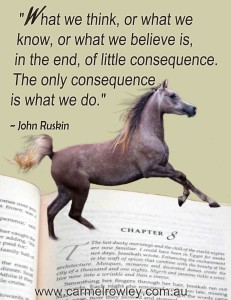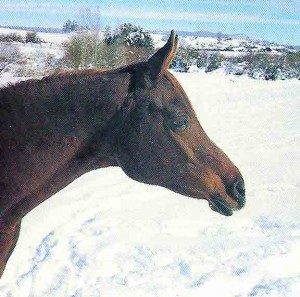WHAT HAVE WE LEARNT FROM THE PAST?
There’s a saying, “Study the past if you would define the future.” ? A desire for knowledge reaches into the past, even when one is mainly solving everyday problems. The solution often requires an understanding of how the problem developed in the first place. Most of us have researched our individual pasts whether to gain information on our families or to gain a better understanding of who we are today.
In my latest book FRAMED the characters discuss how the hard stand-up within the Arabian horse show scene became normal. This has fascinated me for many years and I often wonder why we didn’t learn from those who came before us and realise how damaging it can be to go to the extreme. By studying the past we learn about change and why the change occurs within cultures. Don’t we study the past to acquire a broader and richer understanding of our world today and our place in it?
As I approach the release of my seventh novel I know how difficult it can be to be involved with something you love and not learn from the past? Past mistakes haunt my thoughts every time I release another book but writing my books keeps me connected with the Arabian breed and many of the concerns people discussed forty years ago remain the concerns of breeders today. So do the lessons from the past influence where we’re going in the future? It seems maybe not!
I found these words written by Richard Pritzlaff of Rancho San Ignacio over 28 years ago, they still resonate as if they were written yesterday.
Bint Moniet El Nefous (Nazeer x Moniet El Nefous) Imported as a yearling, she produced 13 foals at Rancho San Ignacio from 1962 to 1976
High in the Sangre de Cristo Mountains of north-eastern New Mexico, Richard Pritzlaff lived on his centuries-old ranch. For fifty years he bred his beloved Arabian horse’s amidst a backdrop of extraordinary beauty and serenity.
“…I have my own ideas about horses. Some of them are controversial, I’m sure, but here they are.
The Bedouin’s Arabian was a calm, quiet horse that conserved its energy for long migrations and for its search for grazing and water. It was not a nervous fidgety animal.
The Bedouin would be horrified to see long whips snapping in front of Arabian’s faces and in front of their legs in order to keep them alert. These actions disturb the horses and cause a look of fear in their eyes. The Bedouin showing his horse to his guests would display it’s alertness through its presence and action The horse would prance and dance, the object being to please his master and the circle of guests. The Bedouin would also ride his horse in order to show his horse’s response to his master, his elegance, his swiftness and his personality.
…Unfortunately, present day Arabian breeders have become more interested in promotion, show winning, and in the Arabian horse as a business investment and tax depreciation item than in the Arabian horse itself. Among all the stallions in the breed, why should twenty or so be considered so superior that they should saturate the breed?Isn’t it better to judge Arabians by their ancestry, especially grandparents and great grandparents, than to judge them by show winning.
What about the weaknesses that are inheritable?
What about the current changes in type?
Are we getting away from the true Bedouin horse through fads and artificiality?
Is the Arabian horse through artificiality losing his true character?”
Short excerpt from an article written by Richard Priztlaff for Arabian Horse World 1983


2 Responses
Pedro Pablo Gomez
Hi, where I can find this book!
I’m a breeder of Arabian horses , and now I start whit a treasure blood lines from Mr Pritzlaff.
Could you help me to find more information about him.
Thanks
Carmel Rowley
Hello Pedro, The excerpt above is from Richard Priztlaff’s article written for the magazine Arabian Horse World in 1983. You could contact the magazine they have a Facebook page https://www.facebook.com/ArabianHorseWorld also do a web search for Arabain Horse Books books written by or co-written by Richard Prizlaff. You can also check Facebook for books there are pages that sell Arabian books. Hope this helps, regards Carmel